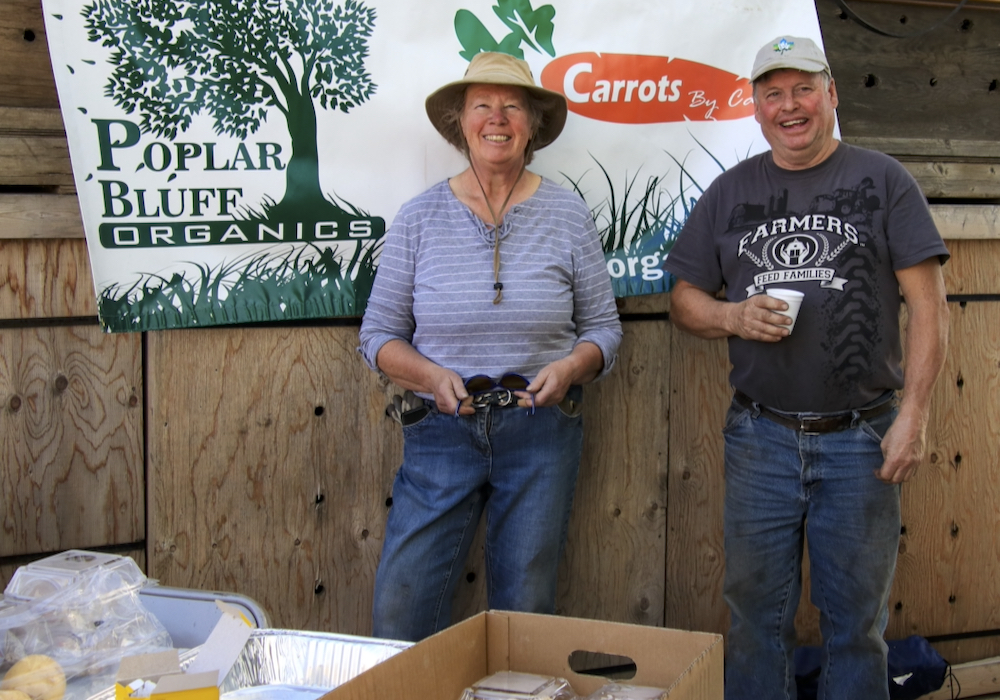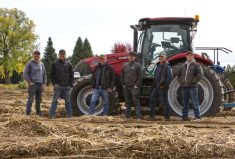Farm partnerships are taking a new direction today. Of course there are still traditional arrangements — formal or informal — between farmers, like those that share the cost of equipment, and there are contractual arrangements, too, like those between a crop processor and a farmer delivering specific specs.
More and more, though, farmers are partnering with off-farm businesses that add value to the commodities they produce and sell them into non-traditional and niche markets.
“One of the primary ways I am seeing that happen is with farms that have historically only had a limited market to sell to, like a local co-op or selling a commodity to whoever has the best price,” says Clint Fischer, founder of Braintrust Ag in South Dakota, an online peer group of more than 300 farmers and ranchers across North America. “Farmers who need to diversify are partnering with more unique end- supply users who are adding value to the commodity and reselling it.”
Read Also

How scientists are using DNA and climate data to breed crops of the future
A method for forecasting how crops will perform in different environments so that plant breeders can quickly select the best parents for new, climate-resilient varieties.
Though Fischer says these sorts of arrangements have come up more often on the livestock end of things, he is seeing farmers sell their value-added products to smaller, name brand distributors and get paid a premium for growing or raising their crops or animals in a specific way to meet niche markets, i.e., organic, regenerative, etc.
“They could go to the local farmers market with their products, but that’s a lot of time and hassle, and so there are companies that are coming in and trying to solve that problem for farmers by bundling products from different producers together and selling them via the internet,” Fischer says. “Those sorts of partnerships are becoming more common as more markets open up.”
In the U.S. Midwest there is a lot of interest in cover crops, for example, so farmers are growing cover crops for seed that they are selling to specialized seed processors for sale to farmers in other parts of the country.
More risk in new markets
There’s a caveat, though. These sorts of arrangements do represent more risk for farmers, Fischer says, because they are not tried and true markets, so farmers need to make sure that whomever they sell their products to is solid and can pay.
“They need to get into the legal terms of what does the partnership look like, what are the terms for payment and who is guaranteeing it; who has the obligation, those sorts of things,” Fischer says. “In a newer market, there is always the risk of non-payment by a partner or middleman.”
Fischer always advises a written contract that sets out the terms and conditions but also what happens if someone doesn’t get paid. Also important to consider are requirements for traceability and tracking through a more complex value chain.
“All these things need to be thought about ahead of time,” Fischer says, but then adds, “Quite frankly, they rarely are.
“When farmers are selling bulk commodities to an elevator or grain buyer, they don’t need the detailed record-keeping they will need if they are selling into more of these niche markets… It adds a layer of complexity to producing that product, and farmers must assess if that is worth the premium price that they are going to make.”
Still a matter of trust
In the end, though, every partnership hinges on trust, whether it’s between two individuals, two farms or two separate businesses. While Fischer would never advise entering into a partnership or agreement of any kind without a written contract, he cautions that the contract is only as good as the trust each has in the other party and their desire to hold each other accountable.
“If you have a disagreement with the partner, are you willing to spend the time and money to bring forth a lawsuit and to hold them accountable to the contract, or enter into some other kind of dispute resolution mechanism like arbitration or mediation?” Fischer asks. “All of that takes money, time and stress. So, before you enter that partnership you have to decide: do I trust this person and am I willing, if I have to, to enforce the contract?”
So how do you establish trust? By doing your homework thoroughly. Fischer suggests you look at any new partnership or business arrangement through the lens of hiring an employee.
“When you are hiring someone, you are going to do a background check on them and check their references to make sure they are a good fit,” he says. When sizing up a potential partner, he adds, “Look at their track record, what’s their history and what’s their reputation in the industry? Are there people who have done business with them that you can get references from? Do they keep their promises, and do they have the financial backing to make good on their agreements?”
And bear in mind, Fischer adds, that even a business with a stellar reputation can run into insolvency issues when markets change, so there is always risk. That’s why no business arrangement should be done on a handshake; both parties need to negotiate what deal they can mutually agree to and then write it down. And though it may seem obvious, no one should sign a contract that someone puts in front of them without making sure they know and understand what is in it, even if that requires hiring
a lawyer to review it, Fischer adds.
“If someone throws a contract at you to sign and you just sign it, that can potentially do more harm than a handshake agreement, because it could be one-sided and you just don’t know,” he says.
Farmer experiences with partnerships
Sometimes, though, handshakes can work. Rosemary Wotske, owner of Poplar Bluff Organics in Wheatland County, Alta., has a longtime partnership with another local farmer, Cam Beard, that has been mutually beneficial to both.
Wotske originally asked if Beard would help deliver her specialty potatoes to her food service and retail customers, but he had an interest in direct marketing too, although he was more at home with a wrench fixing equipment than at marketing.
“He started growing carrots, beets and parsnips and we got this synergy going because I can’t weld, and he loved mechanical stuff, so if I needed some kind of a machine to do this or that he would weld something together that worked,” she says. “I was happy doing the marketing and he was happy not to have to come out of the fields, so the business really grew then.”
Wotkse admits that although they have never had any formal arrangement, the time is coming when they realize they will have to put a more business-like arrangement in place for succession purposes as the business has become more complex, with value-added products such as cold-pressed carrot juice and potato vodka, and plans are in the works to build an on-farm distillery.
Says Wotske: “We have been keeping it arm’s–length but now that the two of us are approaching retirement age, we’re going to need something formal in place because the business is big enough now that no one person can do it all, and we will have to set up a corporation to pick up all the different businesses.”
Partnering with family?
As every farm family likely knows, the trickiest partnerships can be with family and friends. They can be a tangled and emotionally draining process, so farmers are well advised to start with the end in mind.
“Begin with the exit strategy,” says Clint Fischer, founder of Braintrust Ag. “At the start, everyone might be excited and have good intentions, feelings, emotions and ideas. But what happens when there is a breakup in that partnership, which always happens. Because someone will pass away, get disinterested, or get divorced at some point.”
A partnership is never going to last forever, he says.
“Looking at it from the exit strategy first brings reality into the process by addressing these what-if’s right off bat.”
The best thing anyone can do to preserve family relationships through a business partnership is to document everything they agree to in writing and sign it so that, down the road, they can hold each other accountable to what they agreed to.
Fischer also advises agreeing to solve disputes through a trusted third party, such as a board of advisors that everyone agrees on and trusts, or through a formal mediation process. But do put those details in writing at the start.
How do I know if I am good partnership material?
Of course, trust goes both ways, so anyone entering into a partnership, hard as it is, needs to try and be honest about their own personality and attributes. That starts with being aware of your reputation, says Clint Fischer, founder of Braintrust Ag.
“Do what you say you’re going to do. If your reputation has been dinged, work to rebuild that before entering a new partnership that includes people who aren’t in your inner circle and truly ‘know’ you,” he says.
Partners must be willing to compromise, so if that’s something you find impossible to do, then partnerships aren’t for you, he adds.
But that’s not all. A business partnership is like a marriage, there’s give and take but the primary driver is clear, consistent communication.
“What’s in the legal documents is designed to be a framework, but the day-to-day operations demand collaboration between the partners,” Fischer says.
“It’s impossible to document every potential scenario that will happen to the business and the partnership, so the docs are there to detail the big events. The smaller, more frequent events, still demand trust.”
Before entering into this ‘marriage’ farmers should ask themselves “If I were in the shoes of my potential partner, would I partner with me?”
Says Fischer: “If you are honest with that assessment, you can reveal much about yourself and uncover areas of concern for your potential partnership.”
















